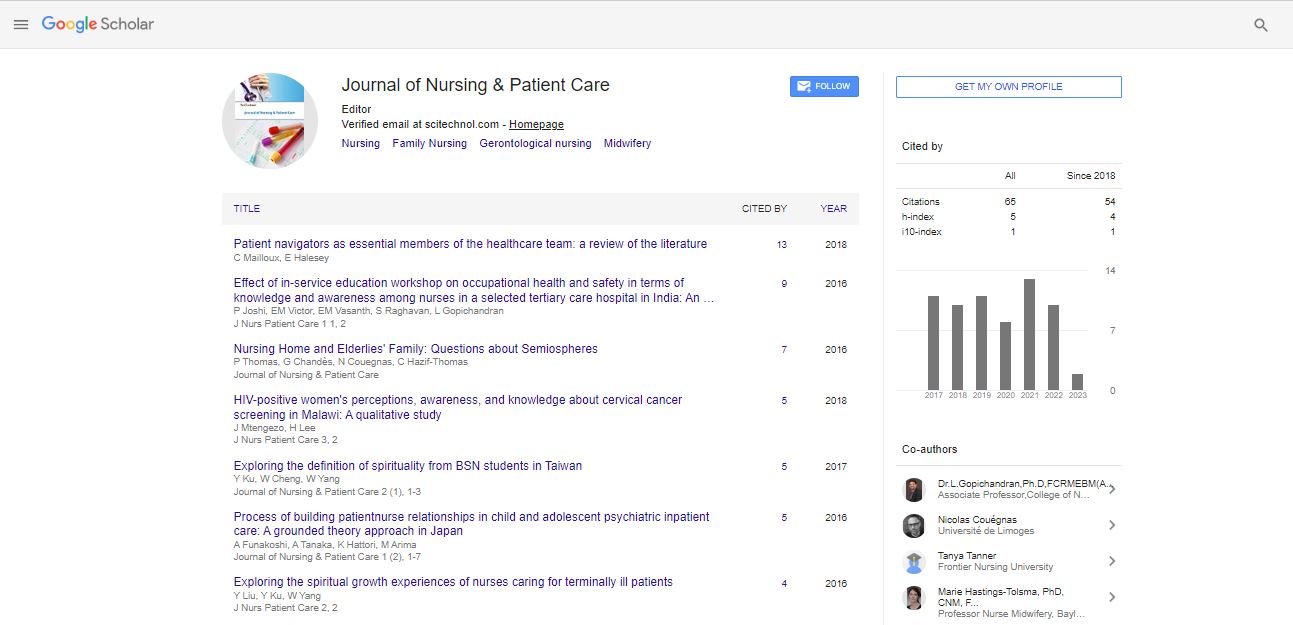Perspective, J Nurs Patient Care Vol: 9 Issue: 1
Patient-Centered Care in Clinical Nursing Practice: Meeting the Unique Needs of Individuals
Zvonak Shi*
1Department of Health Sciences, University of Maribor, Žitna ulica 15, Maribor, Slovenia
*Corresponding Author: Zvonak Shi,
Department of Health Sciences, University
of Maribor, Žitna ulica 15, Maribor, Slovenia
E-mail: shizvo@nak.si
Received date: 19 February, 2024, Manuscript No. JNPC-24-134924;
Editor assigned date: 21 February, 2024, PreQC No. JNPC-24-134924 (PQ);
Reviewed date: 11 March, 2024, QC No. JNPC-24-134924;
Revised date: 20 March, 2024, Manuscript No. JNPC-24-134924 (R);
Published date: 29 March, 2024, DOI: 10.4172/2573-4571.1000055.
Citation: Shi Z (2024) Patient-Centered Care in Clinical Nursing Practice: Meeting the Unique Needs of Individuals. J Nurs Patient Care 9:1.
Description
In the field of healthcare, the concept of patient-centered care has gained increasing recognition as a fundamental approach to delivering high-quality and compassionate services. Patient-centered care places the individual at the forefront of decision-making, acknowledging their values, preferences, and unique circumstances. In clinical nursing practice, embracing patient-centered care is dominant to tending therapeutic relationships, promoting positive health outcomes, and ensuring the overall well-being of patients. This article delves into the significance of patient-centered care in clinical nursing practice and explores strategies for meeting the diverse and individualized needs of patients.
Strategies for meeting the diverse and individualized needs
Patient-centered care is a philosophy that prioritizes the individual needs, values, and preferences of patients, placing them at the center of healthcare decision-making. It encompasses elements such as respect for patient autonomy, active involvement in care planning, effective communication, and shared decision-making, and holistic consideration of patients' physical, emotional, and psychosocial wellbeing. In clinical nursing practice, adopting a patient-centered approach requires nurses to cultivate empathy, cultural competence, and a deep understanding of each patient's unique circumstances.
Establishing therapeutic relationships: Building trust and rapport with patients is essential for attending a patient-centered approach to care. Clinical nurses should take the time to listen attentively to patients' concerns, validate their experiences, and demonstrate empathy and compassion in their interactions. By developing trusting relationships, nurses can create a supportive environment where patients feel comfortable expressing their needs and preferences.
Conducting comprehensive assessments: To provide patientcentered care, nurses must conduct thorough assessments that take into account not only patients' physical health but also their psychological, social, and spiritual needs. By gathering comprehensive data about patients' preferences, values, and goals, nurses can tailor care plans to meet individualized needs and promote positive outcomes.
Engaging in shared decision-making: Collaborative decisionmaking between patients and healthcare providers is a base of patient-centered care. Clinical nurses should involve patients in care planning, treatment decisions, and goal setting, ensuring that interventions align with patients' values, preferences, and treatment goals. By empowering patients to actively participate in their care, nurses promote autonomy and self-determination.
Enhancing communication: Effective communication is essential for promoting patient-centered care. Nurses should communicate information in a clear, concise, and culturally sensitive manner, using language that patients can understand. Additionally, nurses should encourage patients to ask questions, express concerns, and provide feedback, tending open dialogue and mutual understanding.
Providing holistic support: Patient-centered care extends beyond addressing patients' physical health needs to encompass their emotional, social, and spiritual well-being. Clinical nurses should assess patients' psychosocial needs, provide emotional support, and connect patients with resources such as counseling services, support groups, and spiritual care providers. By addressing patients' holistic needs, nurses can promote healing and enhance overall quality of life.
Respecting cultural diversity: Cultural competence is essential for delivering patient-centered care to individuals from diverse backgrounds. Nurses should recognize and respect cultural differences, values, and beliefs, adapting care approaches to align with patients' cultural preferences. By fostering culturally sensitive care environments, nurses can promote trust, collaboration, and mutual respect between patients and healthcare providers.
Advocating for patients rights: As patient advocates, clinical nurses play an important role in ensuring that patients' rights are respected and their voices are heard. Nurses should advocate for patients' preferences, preferences, and wishes, advocating for their autonomy, dignity, and well-being. By serving as champions for patients' rights, nurses empower individuals to make informed decisions and actively participate in their care.
Conclusion
Patient-centered care is the foundation of clinical nursing practice, emphasizing the importance of individualized care that respects patients' autonomy, preferences, and values. By embracing patientcentered principles and implementing strategies to meet the diverse and unique needs of individuals, nurses can foster trusting relationships, promote positive health outcomes, and enhance the overall patient experience. As advocates for patients' rights and wellbeing, clinical nurses play a pivotal role in shaping the delivery of compassionate and patient-centered care that places the individual at the forefront of healthcare decision-making.
 Spanish
Spanish  Chinese
Chinese  Russian
Russian  German
German  French
French  Japanese
Japanese  Portuguese
Portuguese  Hindi
Hindi 